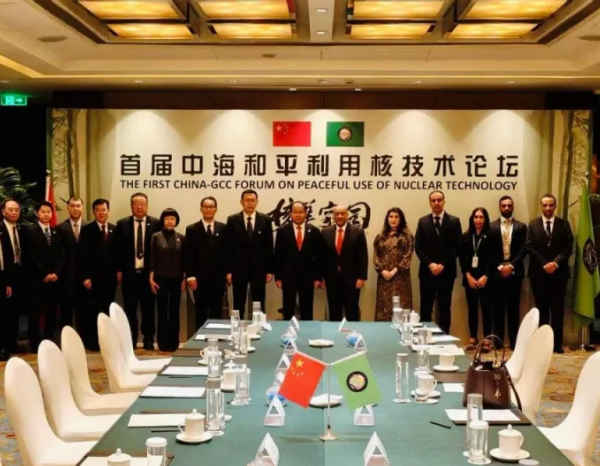Gulf Cooperation Council (GCC) Secretary-General Jasem Mohamed Albudaiwi met with Shan Zhongde, Director of the China Atomic Energy Authority, to discuss prospects for expanded cooperation in the peaceful use of nuclear energy, during the First GCC-China Forum on the Peaceful Uses of Nuclear Technology.
The meeting, held on the sidelines of the forum in Chengdu, capital of China’s Sichuan Province, focused on strengthening bilateral ties in the field of nuclear technology. Both sides highlighted the significance of the event, which included workshops and lectures aimed at deepening technical collaboration and knowledge sharing.
According to a statement by the GCC Secretariat, the discussions between Albudaiwi and Shan covered a broad range of cooperative opportunities, including energy security, technological innovation, and regulatory frameworks for the peaceful application of nuclear science. The talks are seen as part of a wider effort to broaden the scope of GCC-China relations beyond traditional sectors.
Albudaiwi noted that the meeting is in line with the directives laid out in the final communiqué of the Riyadh GCC-China Summit for Cooperation and Development, held in December 2022. That summit called for enhanced strategic partnership and joint initiatives in areas including energy, infrastructure, culture, and advanced technologies.
“The GCC is committed to fostering mutually beneficial partnerships with China across all levels,” said Albudaiwi. “This meeting underscores our shared vision for peaceful technological advancement, particularly in the nuclear field, which holds immense potential for sustainable development across our region.”
Shan echoed those sentiments, emphasizing China’s readiness to support regional nuclear energy programs aimed at peaceful uses such as electricity generation, medical applications, and water desalination.
The GCC-China Forum marked the first official platform dedicated to nuclear cooperation between the two sides, reflecting a broader geopolitical shift toward greater engagement between the Gulf states and Beijing. It also signals the GCC’s growing interest in diversifying its energy mix through clean and sustainable sources.
With both parties pledging to build on the forum’s outcomes, future collaboration is expected to include joint research, regulatory cooperation, and capacity-building programs.
The GCC, comprising six member states—Bahrain, Kuwait, Oman, Qatar, Saudi Arabia, and the United Arab Emirates—has shown increasing interest in nuclear energy as part of long-term economic diversification and energy transition strategies.


